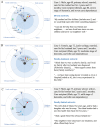Examining the Social Networks Types and Their Effects on Caregiving Experience of Family Caregivers for Individuals With Dementia: A Mixed-Methods Study
- PMID: 38859823
- PMCID: PMC11163924
- DOI: 10.1093/geroni/igae040
Examining the Social Networks Types and Their Effects on Caregiving Experience of Family Caregivers for Individuals With Dementia: A Mixed-Methods Study
Abstract
Background and objectives: Social networks are crucial to personal health, particularly among caregivers of individuals with dementia; however, different types of social networks among caregivers of those with dementia and how these differences are associated with caregiver burden and positive appraisal, remain underexamined. This study aims to depict dementia caregivers' social network types, related factors, and impact on caregiving experiences.
Research design and methods: A questionnaire-based survey was conducted with a total of 237 family caregivers of individuals with dementia nested additional semistructured interviews conducted with 14 caregivers in Chongqing, China. A quantitative study was designed to collect data on personal and situational information, social networks, caregiver burden, and positive aspects of caregiving. Qualitative data were collected via semistructured interviews. Latent class analysis and multivariate regression analyses were applied to quantitative data, and inductive content analysis to qualitative data.
Results: The 3 social network types-family-limited (n = 39, 16.46%), family-dominant (n = 99, 41.77%), and diverse network (n = 99, 41.77%)-differed in age and sex of caregivers and individuals with dementia, stage of dementia, and caregiving intensity. Caregivers in family-dominant networks had a lower caregiver burden (β= -0.299, p = .003) and greater positive aspects of caregiving (β= 0.228, p = .021) than those in family-limited networks. Three themes-accessibility, reciprocity, and reliance-emerged as facilitators and barriers when asking for support. Caregivers frequently cited the perception of economic, practical, and emotional support, yet reported a lack of adequate formal support from healthcare providers.
Discussion and implication: Family caregivers of individuals with dementia have different social network types that vary considerably among sociocultural contexts and perceive various types of support from social networks. Solid family networks and diverse social networks are contributors to long-term dementia care.
Keywords: Alzheimer’s disease; Caregivers; Nursing; Social network; Social support.
© The Author(s) 2024. Published by Oxford University Press on behalf of The Gerontological Society of America.
Conflict of interest statement
None.
Figures
Similar articles
-
Social Networks Effects on Spouse and Adult-Child Dementia Caregivers' Experiences: A Cross-Sectional Study.J Am Med Dir Assoc. 2023 Sep;24(9):1374-1380.e1. doi: 10.1016/j.jamda.2023.04.006. Epub 2023 May 23. J Am Med Dir Assoc. 2023. PMID: 37236264
-
Family dynamics in dementia care: A phenomenological exploration of the experiences of family caregivers of relatives with dementia.J Psychiatr Ment Health Nurs. 2022 Dec;29(6):861-872. doi: 10.1111/jpm.12822. Epub 2022 Feb 2. J Psychiatr Ment Health Nurs. 2022. PMID: 35088516
-
Caregiver- and patient-directed interventions for dementia: an evidence-based analysis.Ont Health Technol Assess Ser. 2008;8(4):1-98. Epub 2008 Oct 1. Ont Health Technol Assess Ser. 2008. PMID: 23074509 Free PMC article.
-
Impact of dementia on informal care: a systematic review of family caregivers' perceptions.BMJ Support Palliat Care. 2020 Oct 14:bmjspcare-2020-002242. doi: 10.1136/bmjspcare-2020-002242. Online ahead of print. BMJ Support Palliat Care. 2020. PMID: 33055092 Review.
-
Remotely delivered information, training and support for informal caregivers of people with dementia.Cochrane Database Syst Rev. 2021 Jan 4;1(1):CD006440. doi: 10.1002/14651858.CD006440.pub3. Cochrane Database Syst Rev. 2021. PMID: 33417236 Free PMC article.
Cited by
-
Assessment of the Quality of Life and Family Function in Attention Deficit Hyperactivity Disorder Caregivers in Al-Ahsa, Saudi Arabia.Cureus. 2024 Sep 25;16(9):e70161. doi: 10.7759/cureus.70161. eCollection 2024 Sep. Cureus. 2024. PMID: 39463622 Free PMC article.
-
Factors related to social disconnectedness among older unpaid caregivers.Front Public Health. 2025 Apr 29;13:1589103. doi: 10.3389/fpubh.2025.1589103. eCollection 2025. Front Public Health. 2025. PMID: 40365433 Free PMC article.
References
LinkOut - more resources
Full Text Sources




